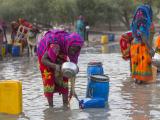Sep 21, 2012
Cheese-related Listeria outbreak reaches 15 cases
The number of cases in a multistate Listeria outbreak tied to imported ricotta salata cheese has grown to 15 with the addition of one case in Washington state, the Centers for Disease Control and Prevention (CDC) reported today. All 15 patients were hospitalized, and three died, as reported previously. Cases have occurred in 12 states and Washington, DC, with illness onset dates ranging from Mar 12 to Aug 30. The cheese distributor, Forever Cheese Inc. of Long Island City, N.Y., recalled one lot of Marte brand Frescolina ricotta salata cheese on Sep 10 and later expanded the recall to all lots, according to the US Food and Drug Administration (FDA). The FDA also said today that the distributor has stopped importing cheese from the Italian maker, Fattorie Chiarappa SRL.
Sep 21 CDC update
Sep 21 FDA statement
Sep 12 CIDRAP News item
Listeria lessons from hospital outbreak
A 7-month investigation of a Listeria monocytogenes outbreak at five Texas hospitals in 2010 faced challenges but produced some useful lessons about testing and documenting patient's food exposures, according to report yesterday in Clinical Infectious Diseases from researchers at the Texas Department of State Health Services. Ten patients were sickened in the outbreak, and listeriosis contributed to five deaths. Medical teams traced the source to chicken salad, then to prepackaged diced celery used in the salad. However, investigators were unable to identify the source of the contamination at the produce facility. Initial polymerase chain reaction (PCR) tests were negative, and the organism required culturing to produce enough colonies for positive PCR results. The authors noted PCR rapid testing of food products might not be enough to detect low-level contamination and should be reevaluated. They also emphasized that the outbreak highlights the vulnerability of hospitalized patients, especially those who are immunocompromised, to Listeria infections.
Sep 20 Clin Infect Dis abstract
Cholera cases in Sierra Leone near 19,000, but pace is ebbing
Cholera cases in Sierra Leone appear to be slowing, but agencies are warning the public to remain vigilant, Voice of America (VOA) reported yesterday. The World Health Organization (WHO) has now reported 18,919 cases in the country, including 273 fatalities, the story staid. Those numbers are up by 411 cases and 2 deaths since the last WHO update on the situation, on Sep 18. Cholera activity in Sierra Leone peaked in August at 2,100 cases per week but has now dropped to about 100 per week. William Perea, MD, MPH, WHO coordinator of the control of epidemic diseases, said the results are promising and show that case management and surveillance are working well, but it is still too early to scale back response efforts.
Sep 20 VOA report
Sep 18 WHO update
Novel coronavirus identified in Saudi Arabia
A doctor involved in the care of a patient with pneumonia in Saudi Arabia has isolated a novel human coronavirus, according to a report he posted on ProMed Mail, the online reporting system of the International Society for Infectious Diseases. Dr Ali Mohamed Zaki, a professor of microbiology at Dr Fekah Hospital in Jeddah, wrote that the virus was isolated from the sputum of a 60-year-old man whose pneumonia infection was associated with acute renal failure. The report did not say whether the patient recovered from the infection. The isolate tested negative for a host of respiratory viruses, but testing with a pancoronavirus RT-PCR showed a band appropriate for a coronavirus. Zaki said the virus RNA was tested at the lab of Ron Fouchier, PhD, at Erasmus University in the Netherlands, which confirmed that the isolate was a new member of the beta group of coronaviruses, which are closely related to bat coronaviruses. The virus is undergoing further characterization at the lab. SARS (severe acute respiratory syndrome), which caused a global outbreak in 2002 and 2003 that killed more than 700 people, was caused by a then-novel coronavirus.
Sep 20 ProMed Mail post
















